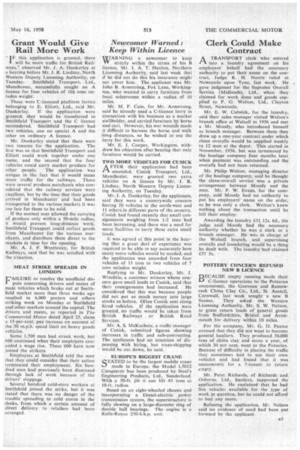Grant Would Give Rail More Work
Page 37

If you've noticed an error in this article please click here to report it so we can fix it.
IF this application is granted, there will be more traffic for British-Railways," observed Mr. J. A. Dunkerley at a hearing before Mr. J. R. Lindsay, North
Western Deputy Licensing Authority, on Tuesday. Smithfield Transport, Ltd., Manchester, successfully sought an A licence for four vehicles of 101 tons unladen weight.
These were C-licensed platform lorries belonging to E. Elliott, Ltd., said Mr.
Dunkerley. If the application were granted, they would be transferred to Smithfield Transport and the C licence surrendered. Smithfield Transport had two vehicles, one on special A and the other on ordinary A licence.
Mr. Dunkerley stated that there were two reasons for the application. The first was so that Smithfield Transport and Elliott could work together under one name, and the second that the four vehicles could carry market produce for other people. The application was unique in the fact that it would mean more traffic for the railways. There were several produce merchants who considered that the railway services were excellent, but by the time that their goods arrived in Manchester and had been transported to the various markets it was too late for them to be sold.
If the normal user allowed the carrying of produce only within a 50-mile radius, it would prevent long-distance work. Smithfield Transport could collect goods from Manchester for the 'various merchants, and distribute them direct to the markets in time for the opening.
Mr. A. J. F. Wrottesley, for British Railways, said that he was satisfied with the situation.
MEAT STRIKE SPREADS IN LONDON r AILURE to resolve the unofficial dis
pute concerning drivers and mates of meat vehicles which broke out at Smithfield market more than three weeks ago resulted in 6,000 porters and others striking work on Monday at Smithfield and other markets around the capital. The drivers and mates, as reported in The Commercial Motor dated April 25, claim a 15-per-cent. pay increase on account of the 30 m.p.h. speed limit on heavy goods vehicles.
Some 1,700 men had struck work, but 600 continued when their employers conceded a wage rise. These 600 have now joined the strikers.
Employers at Smithfield told the men that they could consider that their action terminated their employment. Six hundred men had previously been dismissed through lack of work because of the drivers' stoppage.
Several hundred cold-store workers at Smithfield joined the strike, but it was stated that there was no danger of the trouble spreading to cold stores in the docks, from which a certain amount of direct delivery to retailers had been arranged.




































































































